Early life
| | This section is empty. You can help by adding to it. (June 2022) |
Akram Ahmed | |
|---|---|
| Nationality | Bangladeshi |
| Citizenship | Pakistan Bangladesh (after 1971) |
| Known for | Bir Uttom |
Akram Ahmed was a veteran of the Bangladesh Liberation War as a pilot as part of Operation Kilo Flight, the beginning of Bangladesh Air Force. [1] For his bravery in the war, the government of Bangladesh awarded him the title of Bir Uttom, one of a few civilians to have received the award. [2]
| | This section is empty. You can help by adding to it. (June 2022) |
In 1971, Akram Ahmed worked in the East Pakistan Plant Protection Directorate. At that time, the Plant Protection Directorate had its own crop duster to control insects. When the Bangladesh Liberation War started, he fled from Dhaka to India in May. There he met Khaled Musharraf and expressed interest in taking part in the ground war. Khaled Musharraf told him to stay in Agartala for some time. A few months later the air wing of Mukti Bahini was formed. Ahmed took part in about 12 took part in the attack. [3]
After midnight on 2 December 1971 Ahmed flew a small plane from an Indian airport for Bangladesh. He was accompanied by Shamsul Alam. Their target was the oil depot in Chittagong Port. They arrived at their target after flying for about three hours. They successfully bombed the airport with no navigation equipment except a compass. [4]
After the Bangladesh Liberation War ended Ahmed joined Bangladesh Biman, the national airlines of Bangladesh. [5] He was active in the Nirmul Committee. [2]
Ahmed worked as a senior consultant of Civil Aviation Authority of Bangladesh. [5]
Ahmed died on 7 December 2020, at the Combined Military Hospital in Dhaka. [5] [6] He was hospitalized with pneumonia after catching COVID-19 during the COVID-19 pandemic in Bangladesh. [5] He was buried in Banani graveyard with a guard of honor provided by Bangladesh Air Force. [6] [5]

Barisal Division is one of the eight administrative divisions of Bangladesh. Located in the south-central part of the country, it has an area of 13,225 km2 (5,106 sq mi), and a population of 9,325,820 at the 2022 Census. It is the least populous Division in Bangladesh. It is bounded by Dhaka Division on the north, the Bay of Bengal on the south, Chittagong Division on the east and Khulna Division on the west. The administrative capital, Barisal city, lies in the Padma River delta on an offshoot of the Arial Khan River. Barisal division is criss-crossed by numerous rivers that earned it the nickname Dhan-Nodi-Khal, Ei tin-e Borishal.

The Bangladesh Air Force (BAF) is the aerial warfare branch of the Bangladesh Armed Forces. The air force is primarily responsible for air defence of Bangladesh's sovereign territory as well as providing air support to the Bangladesh Army and Bangladesh Navy. Furthermore, the BAF has a territorial role in providing tactical and strategic air transport and logistics capability for the country.

Bir Bikrom is the third highest gallantry award in Bangladesh. Like the other gallantry awards, this was introduced immediately after the Bangladeshi Liberation War. Bir Bikrom was awarded to 175 fighters.

Mohammad Ataul Gani Osmani was a Bangladeshi military officer and revolutionary. His military career spanned three decades, beginning with his service in the British Indian Army in 1939. He fought in the Burma Campaign during World War II, and after the partition of India in 1947, he joined the Pakistan Army and served in the East Bengal Regiment, retiring as a colonel in 1967. Osmani joined the Provisional Government of Bangladesh in 1971 as the commander-in-chief of the nascent Bangladesh Forces. Regarded as the founder of the Bangladesh Armed Forces, Osmani retired as the first full general from the Bangladesh Army in 1972.
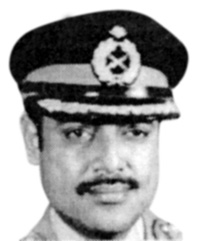
Major General Khaled Mosharraf BU was a Bangladeshi army officer who is known for his role in the Bangladesh Liberation War and the subsequent coups in post-independence Bangladesh. After deposing Khondakar Mustaq Ahmad in the 3 November 1975 coup, Mosharraf was assassinated on 7 November 1975.
Shafaat Jamil, Bir Bikrom was a Bangladesh Army colonel. He was the commanding officer of the 3rd East Bengal Regiment of Z Force Brigade in Sector 11 of Bangladesh Forces during the War of Bangladesh Independence in 1971. He was among the first Bengali officers who rebelled against the Pakistani Army in the 1971 Liberation War of Bangladesh and later fought in 11 sector and in Sylhet sector.
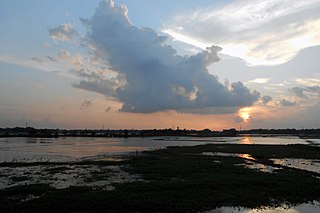
Raipura is an upazila of Narsingdi District in the Narsingdi District belonging to Dhaka Division. It is the second largest upazila of Bangladesh.
Hemayet Bahini was a guerrilla militia force of Bangladesh in the Bangladesh Liberation War of 1971. This small force was known by the name of its leader and organizer Mohammad Hemayet Uddin Bir Bikrom.
Kazi Mohammed Safiullah, Bir Uttam, also known as K M Safiullah, is a retired Bangladeshi general, former Chief of Army Staff of the Bangladesh Army, and former member of parliament.
Melaghar Camp was a training camp for Bengali guerrilla fighters during the Bangladesh Liberation War. In a cabinet meeting of the Provisional Government of Bangladesh, held on July 11, 1971, the Bangladesh Forces were divided into eleven sectors. Melaghar, near Agartala, India, was the headquarters of sector two.
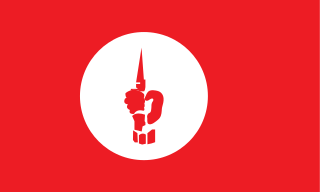
The Mukti Bahini, also known as the Bangladesh Forces, was the guerrilla resistance movement consisting of the Bangladeshi military, paramilitary and civilians during the Bangladesh Liberation War that transformed East Pakistan into Bangladesh in 1971. They were initially called the Mukti Fauj.
The Crack Platoon was a special commando team of the Mukti Bahini. which was formed in 1971, during the Bangladesh Liberation War. It was formed by young members of the Mukti Bahini, which carried out commando operations in Dhaka and its surroundings and led by Major Khaled Mosharraf. The commandos were mostly students and civilians, who received guerrilla training later in the training camps for Mukti Bahini and then engaged in battle against the Pakistani Army.
Shariful Alam Imam Ahmed was a participator in Bangladesh Liberation War. He is most widely remembered as the husband of "Shaheed Janani" Jahanara Imam and as the father of Guerrilla fighter Shafi Imam Rumi. He is a character in Jahanara Imam's famous memoir Ekattorer Dingulee.
Mirza Aftabul Qader was a Bangladesh Army officer who was killed in the Bangladesh Liberation war. He was posthumously awarded Bir Uttam by the government of Bangladesh.
Khwaja Nizamuddin Bhuiyan was a Bangladeshi officer in the Gonobahini, who was killed fighting in the Bangladesh Liberation war. He was awarded Bir Uttam, the second highest military award in Bangladesh. He won the Independence Award in 2023 for his contribution to the field of Independence and Liberation War.
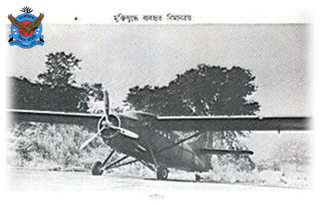
Kilo Flight was the code name for the Mukti Bahini combat aviation formation during the Bangladesh Liberation War in 1971. It consisted of one DHC-3 Otter plane and one Alouette III helicopter, both carrying rocket pods and machine guns for launching hit-and-run attacks on Pakistani targets, and one DC-3 Dakota for logistical missions. 9 Bengali pilots and 58 former PAF personnel formed the unit under the command of Group Captain A. K. Khandker in September 1971. The aircraft were supplied by Indian Authorities and the formation was led by Squadron Leader Sultan Mahmud under the operational control of IAF base Jorhat. The unit started training in October 1971 at Dimapur in Nagaland, and this unit was the first to launch airstrikes on Pakistani targets in East Pakistan on December 4, 1971, by attacking oil depots at Narayanganj and Chittagong. In total the unit flew 90 sorties and 40 combat missions between December 4 and 16, 1971. After the war, this unit formed the core of the nascent Bangladesh Air Force.
Khondkar Nazmul Huda was a veteran of the Bangladesh Liberation War. The Bangladesh government awarded him the title of Bir Bikrom for his bravery in the war of independence.
Shamsul Alam was a veteran of Bangladesh Liberation war. For his bravery during Operation Kilo Flight the Government of Bangladesh awarded him the title of Bir Uttom. He was awarded the Independence Day Award in 2017.
Abdus Salek Choudhury was a veteran of the Bangladesh Liberation War. For his bravery in the Bangladeshi war of independence, The Government of Bangladesh awarded him the title of Bir Uttom. He held the rank of Captain during the war. He served as Commander of Sector-2.
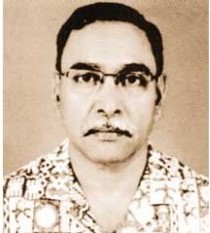
Liaquat Ali Khan is a freedom fighter of the Bangladesh Liberation War. The Bangladesh government awarded him the title of Bir Uttom for his bravery in the independence war.